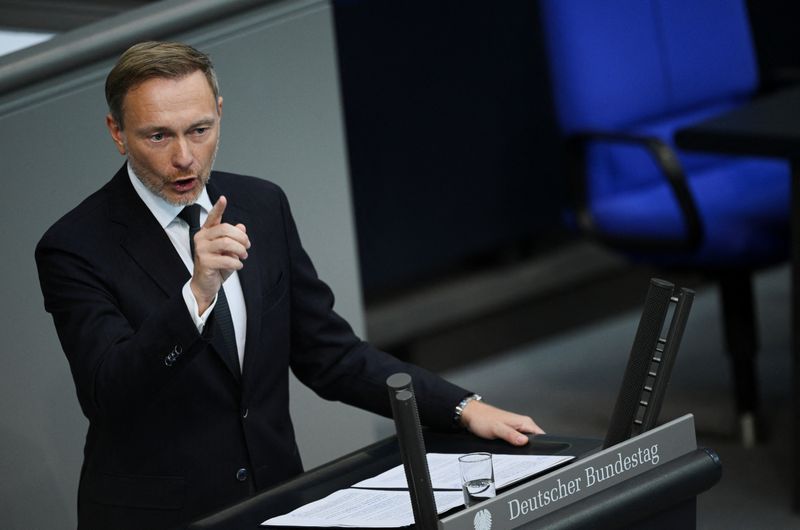By Maria Martinez and Christian Kraemer
BERLIN (Reuters) -Germany's budget for 2024 is one of the first steps in its return to sustainable finances, made necessary by higher borrowing costs and greater financial burdens in the years to come, German Finance Minister Christian Lindner said on Tuesday.
Europe's biggest economic power is aiming to curb spending that surged in response to COVID-19 and a run-up in energy prices triggered by the Ukraine war.
Lindner plans to comply with Germany's debt brake that constitutionally limits structural budget deficit to 0.35% of economic output. The brake was suspended between 2020 and 2022 to help deal with the crises and restored this year.
"We need to recognise our new fiscal realities," he said while presenting the draft for the 2024 budget and financial plans through 2027 to parliament. "We need to refocus," he told parliament's lower house, the Bundestag.
The draft budget plans net new debt of 16.6 billion euros ($17.82 billion) for 2024, with spending of 445.7 billion euros, down from 476.3 billion estimated for 2023.
"The issue is the return to the debt brake or, more precisely, to sustainable public finances in the long term."
Lindner said the clearest signal change in fiscal policy was necessary was the increase in interest rates.
Germany expects to pay 37 billion euros in interest on its debt next year, which Lindner said was a tenfold increase compared to the year 2021 and an amount twice as high as the budget of the Ministry of Education and Research.
"The message is therefore clear: we simply cannot afford to run up new debts without limit; they would be impossible to finance," Lindner said.
'AN ICEBERG COMING'
He warned budget negotiations would get tougher in 2028 and beyond, when Berlin will face additional burdens, such as repayment of pandemic-era debts and European Union funds, it did not have to account for in the 2024-2027 medium-term financial plan.
"Behind the horizon line, not yet visible to us, there is an iceberg coming," he said. "We have to change course now, because the iceberg will not change course."
The finance ministry forecasts a budget gap of around 5 billion euros per year between 2025 and 2027, but later the repayments of pandemic debts to the tune of 12 billion euros per year will add to that. In 2031 the repayments of Germany's Economic Stabilisation Fund will also come due.
In addition, the German government has committed to the 2% NATO spending target. This will be achieved until 2027 with the help of the 100 billion euro special fund for the modernisation of the German armed forces.
In 2027, however, the fund will probably be completely exhausted, Lindner said.
"From 2028 onwards, considerable funds will therefore be needed in the core budget to comply with the goal. We are talking about a double-digit billion euro amount," Lindner said.
Some economists say the debt brake hinders investment but Lindner said it was not the case.
"The debt brake is not a brake on investment, but it does force us to set priorities," Lindner said.
The budgetary plan targets 54.2 billion euros in investments in 2024, up from 38 billion euros in 2019, before the crisis started, and rising to 57.2 billion in 2027.
The Bundestag is meeting to discuss the budget and financial planning this week and has until Dec. 1 to decide on the entire federal budget.

Between now and then, the draft budget is likely to change significantly, in part to take into account the new tax estimate due in October and updated economic forecasts.
($1 = 0.9315 euros)